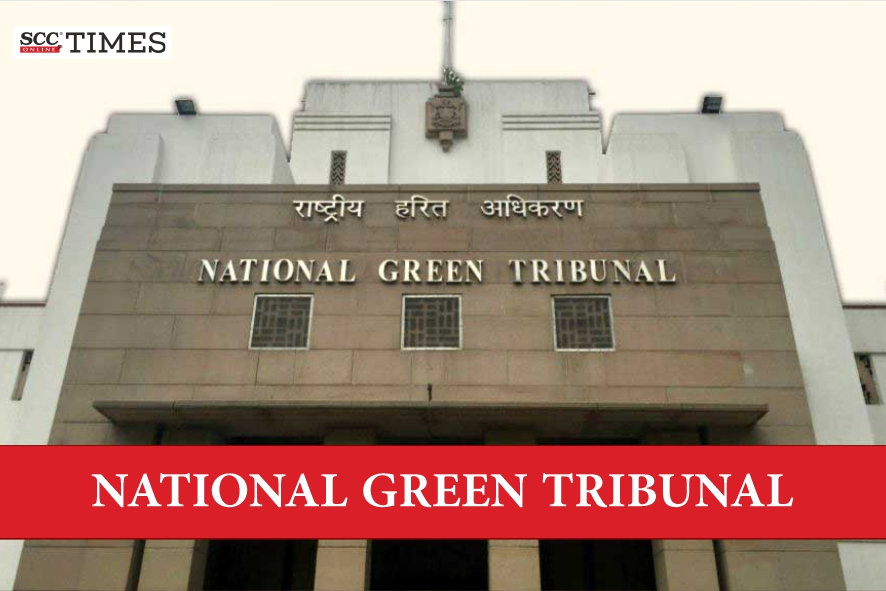National Green Tribunal, Principal Bench, New Delhi: In an application against the illegal tree felling and allowing unauthorised religious construction on greenbelt land despite court’s injunction, a Division Bench of Arun Kumar Tyagi, J., and Dr. Afroz Ahmad (Expert Member), while condemning the use of religious sentiment as a camouflage for illegal encroachment of greenbelt land, issued show cause notice to the respondents.
The instant matter originated from a letter dated 09-09-2023, sent by the applicant, the Deputy Manager, Omaxe Build Home Ltd., concerning illegal tree felling and unauthorized construction on greenbelt land across plots 1 and 22 in Park P-10, Omaxe City, Bathinda. The letter was treated as an Original Application (O.A.) by the NGT.
The NGT, vide order dated 02-07-2024, constituted a Joint Committee comprising the Deputy Commissioner, Bathinda; Divisional Forest Officer; State Pollution Control Board (PPCB); and Bathinda Development Authority, tasked with inspecting the site, gathering records, taking remedial/preventive/punitive action if violations were found, and submitting a report. A report dated 24-09-2024 was submitted by the Environmental Engineer of PPCB, leading to registration of the report as Misc. Application for further orders. Vide order dated 10-02-2025, the NGT impleaded several authorities as respondents.
The NGT took serious note that despite the order of status quo issued by the Civil Judge, vide order dated 16-09-2023, which stated that “unauthorized construction of a religious structure in Park No. 10 was allowed to be completed by the Project Proponent—Omaxe Buildhome Limited and the Bathinda Development Authority,” the respondents showed deliberate inaction and disregard of judicial authority and environmental laws.
The NGT cited Bangalore Medical Trust v. B.S. Muddappa, (1991) 4 SCC 54 and Virender Gaur v. State of Haryana, (1995) 2 SCC 577 and observed that “parks/open spaces in residential areas… are treated as lungs thereof” and their illegal encroachment is violative of the Right to Life under Article 21 of the Constitution. The NGT asserted that these spaces must be preserved in public interest, as they ensure ecological balance and health security of residents.
“…no person, natural or juristic, of whatever rank or profile, can be allowed to occupy the public parks/open spaces for their personal or commercial use or for religious or any other kind of activity. The Right to Life under Article 21 of the Constitution includes within it the Right to Clean and healthy environment.”
The NGT condemned the use of religion as a cloak for encroachment of greenbelt land and stated “none of the religious faiths provides any shield to such illegal activities.” The NGT emphasised that structures raised illegally on public land in the name of religion are liable to be demolished without hesitation.
“Any construction, which is illegally raised by encroaching upon any public lands/public parks, cannot be accorded the status of religious structure for its protection for the simple reason that the religious scriptures require setting up of any religious structure with vidhi-vidhan necessitating compliance not only with religious but also legal and societal norms and any such construction of any religious structure on public land/public park will be liable to be demolished by the concerned administrative authorities without any reservation/hesitation at all immediately for restoration of the public lands/public parks to its original state.”
The NGT further clarified that such constructions cannot be legitimised merely by their religious character, especially when they are raised without compliance with legal and planning norms. While referring to Union of India v. State of Gujarat, SLP (C) No. 8519 of 2006, the NGT reiterated that no unauthorized religious construction is permissible on public land and that all authorities must act in aid of Supreme Court orders under Article 144 of the Constitution.
“Order dated 29.09.2009 passed by Hon’ble Supreme Court… is binding on the State of Punjab and its instrumentalities… Article 144 of the Constitution of India mandates that all authorities, civil and judicial, shall act in aid of the Supreme Court.”
The NGT found that despite its specific directions, the authorities “did not proceed beyond issuance of show cause notice,” thus failing their constitutional and statutory duties under the National Green Tribunal Act, 2010.
The NGT issued of show cause notices to respondent 1 (State of Punjab (Secretary, Department of Science, Technology and Environment), respondent No 3 {District Magistrate, Bathinda) and respondent 4 (Chief Administrator, Bathinda Development Authority}, asking why they should not be prosecuted for non-compliance with the NGT’s order, arrested and detained in civil prison until the order is executed.
The NGT directed the Registry to issue show cause notices with instructions to file replies and compliance reports at least one week before the next date of hearing. The Court further directed to list the matter again for further proceedings upon receipt of the compliance reports and responses to the show cause notices.
[Er Shivcharanjit Singh v. State of Punjab, 2025 SCC OnLine NGT 158, Decided on 30-04-2025]
Advocates who appeared in this case :
Mr. Siddhant Sharma, Counsel for the Respondent No. 1 and 3
Mr. Bhanwar Pal Singh Jadon, Mr. Harsh Vardhan Singh Rajawat, Ms. Gargi Chaturvedi and Ms. Anjali Sharma, Counsel for the Respondent No. 2
Mr. Shubham Bhalla and Ms. Neha Verma, Counsel for the Respondent No. 4
Mr. Baljinder Singh, District Town Planner Bathinda, Counsel for the Respondent No. 5
Mr. Anchit Singla, Counsel for the Respondent No. 6
Mr. Karanjot Singh, Counsel for the Respondent No. 7


